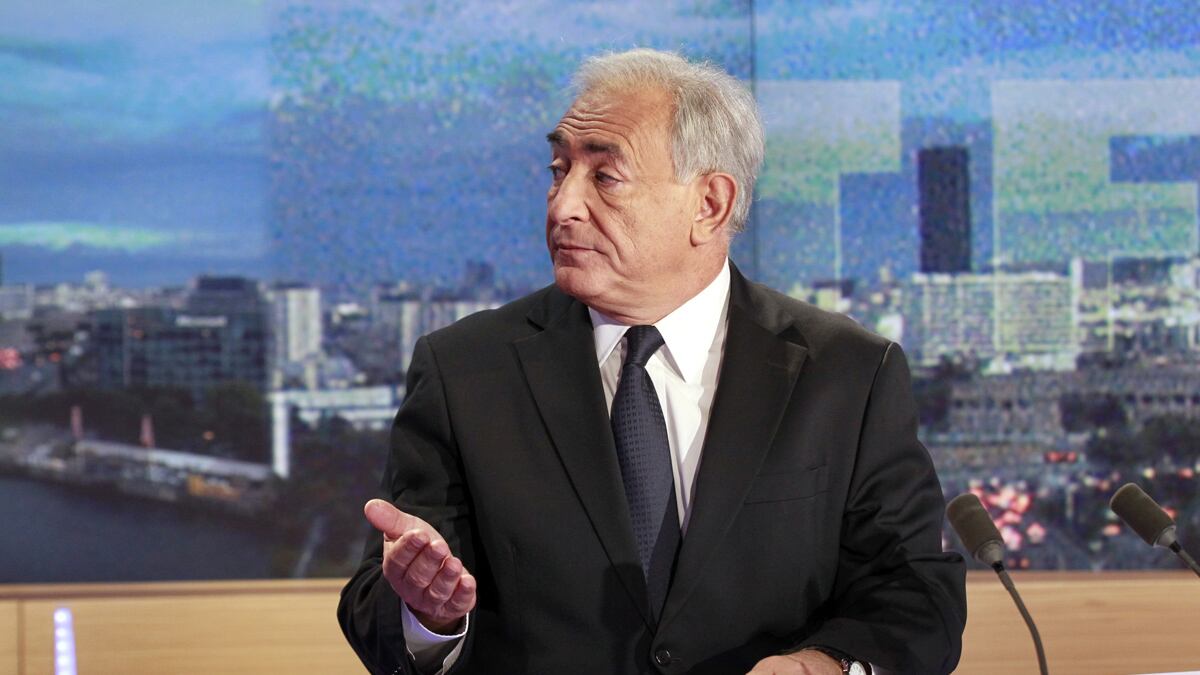The reviews landed quickly, and they were anything but good. Nearly 13.5 million French viewers–about one fifth of the country’s entire population–tuned in Sunday night to watch Dominique Strauss-Kahn's first public attempt at explaining those nine problematic minutes with chambermaid Nafissatou Diallo in his suite at the Times Square Sofitel on May 14. The ratings for his long-awaited interview outdid any French newscast since the urban riots of 2005. But the primet-ime performance by the former International Monetary Fund chief didn’t seem to change many people’s minds about him. And with the young writer Tristane Banon now threatening to sue the fallen politician if French public prosecutors drop her attempted rape case against him, it’s clear DSK's troubles are far from over.
Each observer seems to have been annoyed by a different Strauss-Kahn turn of phrase in the 24-minute interview. Some hated his tone-deaf assertion that he has behaved with “lightness” toward women. Others were appalled by the way he left open the suggestion, even after admitting to a “moral error,” that he may have fallen into a “trap” or a “conspiracy.” Many ridiculed Strauss-Kahn’s self-serving interpretation of the Manhattan district attorney’s report requesting that the charges against DSK be dropped. Libération, the left-leaning daily most attuned to his Socialist Party, found fault with the only part of the exercise that many found appealing: Strauss-Kahn’s closing analysis of the current economic debacle in Europe. “The twirling, rediscovered panache of a DSK mastering economics, explaining the Greek crisis, suddenly seems just as anachronistic as it does out of place,” concluded the daily's lead editorial. “Turning off our televisions last night, we had a furious desire to move on to other things.”
Fellow politicians were similarly unforgiving. Far-right National Front leader Marine Le Pen told the LCI news channel “the man has the greatest contempt for women, to whom he ascribes a utilitarian function.” But colleagues from DSK’s own Socialist Party weren't much kinder. Arnaud Montebourg, one of the contenders for the party's nomination in the runup to next year’s presidential election, said he was unconvinced by DSK's display. “He could have, he should have, apologized so we could talk about something else,” he told Europe 1 radio. Too late for that now, apparently: Montebourg suggests at this point that DSK just “subject himself to a methodical silence.” Ségolène Royal, also seeking the party’s nomination despite her loss to Nicolas Sarkozy in the 2007 presidential election, promised French radio that if she wins this time, Strauss-Kahn will would have no place in her government. She just wants to “turn the page,” she said.
Despite his pledge to stay out of his party’s nominating process, Strauss-Kahn managed to do the opposite in his interview, stirring up all kinds of trouble with a single remark. He said that before his hopes of running for president were derailed by his arrest in New York, he and his fellow Socialist Martine Aubry (until now a leading candidate for the nomination) had a pact: whichever of them seemed to have a better shot at the presidency would go for the nomination, while the other would sit out the race. There have been rumors of such a deal for years, despite Aubry’s denials. Some are now calling DSK's faux pas “a kiss of death” for Aubry as it makes her seem like no more than his understudy. One France 2 TV pundit suggested that the revelation was Strauss-Kahn’s revenge for a remark Aubry made last month on a TV talk show: “I think the same way as many women about Dominique Strauss-Kahn's attitude toward women.” In any case, backers of the Socialists’ current front runner, François Hollande, can hardly contain their glee.
The interview also provoked a counterattack from the French newsweekly L'Express. In response to Strauss-Kahn’s charge that the magazine had turned into a tabloid with its muckraking coverage of the Sofitel affair, editor in chief Christophe Barbier published a sharply worded open letter addressed to “Mister former Managing Director of the IMF." Three years ago, Barbier wrote, the magazine ran a cover on DSK's consensual affair with an IMF subordinate, Hungarian economist Piroska Nagy. “We shone a light on your questionable behavior toward women and the danger your private life posed to your public life,” writes Barbier. “If you had taken into account our analyses then, instead of reproaching us for them today, you might at this moment be the favorite for the presidential election.”
The interview posed a particular disappointment to the 53 percent in a poll taken before the broadcast who said they hoped he would announce his retirement from politics. Instead he left the door open to an undefined role in public life after a period of rest. Nevertheless, there remain some who are keen to see more of Strauss-Kahn–his accusers' lawyers. Tristane Banon, the young writer accusing Strauss-Kahn of attempted rape in France, and her lawyer David Koubbi made an appearance on the popular Grand Journal talk show on Monday to comment on the TF1 interview and promised to bring a civil suit against Strauss-Kahn if the public prosecutors’ office decides not to pursue her case against him.
Nafissatou Diallo's New York lawyers also caught Strauss-Kahn's appearance and were unimpressed. “Although he did acknowledge he acted immorally, as we predicted, DSK did not explain any details of what happened on May 14,” Diallo counsel Douglas Wigdor told The Daily Beast in an e-mail response after Strauss-Kahn's appearance. “That is inexcusable as Ms. Diallo has already done so with reputable journalists.” (A pointed dig at the woman who conducted the interview, Claire Chazal–who happens to be a friend of Strauss-Kahn's wife, Anne Sinclair.) “We are confident that people will see his interview with his wife's friend for what it was–a desperate ploy to gain sympathy with the French public,” Wigdor continued. “We look forward to greeting him in our offices and asking him the questions the reporter failed to do.” It's so nice to feel wanted.
With Christopher Dickey






